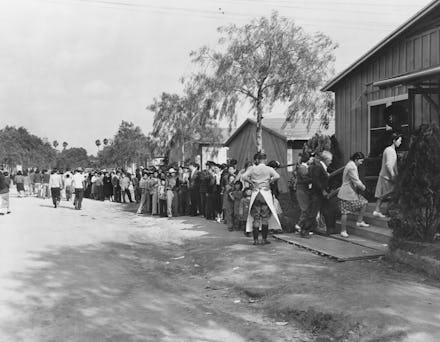California is set to finally apologize for Japanese internment during World War II

On Thursday, California Gov. Gavin Newsom is expected to sign House Resolution 77, which formally apologizes for the internment of Japanese Americans during World War II. The legislation, introduced by California state lawmaker Al Muratsuchi, details the legacy of the state’s racist treatment of Japanese people: On Feb. 19, 1942, President Franklin D. Roosevelt signed Executive Order 9066, which allowed for the federal government to incarcerate 120,000 Japanese Americans in internment camps along the West Coast and in Arkansas, believing them to be enemies of the state and threats to national security.
Per Muratsuchi's bill, after the Pearl Harbor bombing in 1941, U.S. Army officials met with California's governor and reported that the state was not prepared to defend itself, that some Japanese Americans living in the state were spies for Japan, and that these individuals had weapons and ammunition that rivaled that of the American military. The legislation additionally details the California Alien Land Law Act of 1913, which prohibited immigrants from Japan and those of Japanese heritage from buying, leasing, or owning land.
These beliefs were unfounded and rooted almost entirely in racist sentiment while the war with Japan raged on. “The Assembly apologizes to all Americans of Japanese ancestry for its past actions in support of the unjust exclusion, removal, and incarceration of Japanese Americans during World War II, and for its failure to support and defend the civil rights and civil liberties of Japanese Americans during this period,” Muratsuchi's bill reads. The bill also says that the criminalization of Japanese Americans and their descendants inflicted a “great human cost of abandoned homes, businesses, farms, careers, professional advancements, disruption to family life, and public humiliation.”
This isn’t the first time a formal apology has been made to Japanese Americans for internment and its legacy. In 1988, President Ronald Reagan signed the Civil Liberties Act of 1988, which provided a formal apology on behalf of the country as well as $20,000 to surviving Japanese Americans interned during WWII as reparations.
Last year, Newsom established Jan. 30 as Fred Korematsu Day in California, in commemoration of the 23-year-old Japanese American who refused to obey Roosevelt's executive order, arguing that it violated his Fifth Amendment rights. His case made it all the way to the Supreme Court, where the judges ruled in Korematsu v. United States that the evacuation order for internment was valid. Korematsu was reopened in 1983 when a district court judge ruled that the government’s legal team had destroyed and suppressed evidence in the Supreme Court case that stated that Japanese Americans posed no threat to the country’s national security.
House Resolution 77's text is rather pointed, and it includes a not-so-subtle nod to the Trump administration’s treatment of Muslim Americans, Iranian Americans, and those attempting to immigrate or seeking asylum at the U.S.'s border with Mexico. “Given recent national events," the bill reads, "it is all the more important to learn from the mistakes of the past and to ensure that such an assault on freedom will never again happen to any community in the United States."